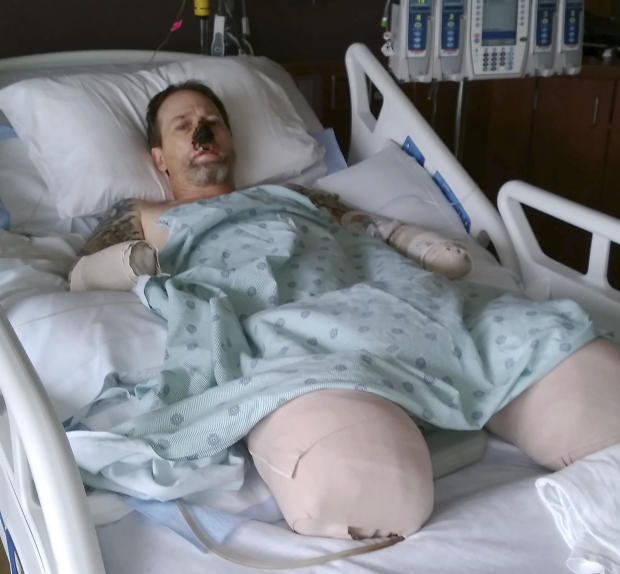How does dog saliva turn into a life-threatening infection?
MILWAUKEE — A Wisconsin man was preparing for additional surgeries after having part of his legs and forearms amputated because of a dog lick that led to a rare blood infection, his wife said Thursday.
Greg Manteufel, 48, has been hospitalized since late June, when he went to a Milwaukee-area hospital with flu-like symptoms. His condition rapidly deteriorated and doctors had to take drastic measures to save his life.
He was in good spirits despite having undergone seven surgeries so far, his wife, Dawn Manteufel, told The Associated Press.
She said her husband was heading into the operating room again on Thursday and still had three more surgeries to go, but that he was looking forward to being fitted for prosthetic limbs.
"He's happy to be here. He said he didn't come this far to cry about it and say, 'Why me?'" she said.
A very rare case
Manteufel was diagnosed with a blood infection caused by capnocytophaga, bacteria that is common in the saliva of cats and dogs but almost never leads to illness, said Dr. Silvia Munoz-Price, an epidemiologist with Froedtert & the Medical College of Wisconsin, where Manteufel is being treated.
The doctor said animal lovers have no need to panic: They're more likely to die in a car accident than to be infected by the bacteria.
"It's extremely rare. Do not get rid of your pets. Continue behaving the same way that you have behaved with your pets up until now," Munoz-Price said.
Though rare, there was a similar case documented in 2016. Doctors in London said a 70-year-old woman was infected with capnocytophaga apparently after being licked by her Italian greyhound. Writing in the medical journal BMJ Case Reports, they said she developed confusion, a headache, diarrhea, a high fever, and eventually sepsis and organ failure. They said she recovered after two weeks of intensive care treatment and antibiotics.
How does the infection spread?
Dawn Manteufel said her husband's symptoms began on June 26, with a fever and pain in his legs. But then he started experiencing delirium, and bruises and blemishes developed during the short car ride to a hospital in West Bend, Wisconsin, where he was treated initially, she said.
The infection caused Greg Manteufel's blood pressure to drop and circulation in his limbs to rapidly decrease, which in itself isn't unusual for blood infections, Munoz-Price said. The infection was quickly cleared with antibiotics, but the problem in Manteufel's case "was that his body mounted an overwhelming response to this original blood infection and he shut down the circulation of his limbs," the doctor said.
Doctors first amputated Manteufel's legs, just below the knee. His forearms were amputated two weeks later, his wife said.
The tip of her husband's nose also lost blood circulation and will need surgery to repair, she said.
It's unknown which dog gave Manteufel the infection. He and his wife own an 8-year-old pit bull, but she said her husband came in contact with several dogs in the days leading to his infection, including a stray he encountered during his job as a house painter.
Certain people are at greater risk
According to the U.S. Centers for Disease Control and Prevention, up to 74 percent of dogs and up to 57 percent of cats have capnocytophaga. People also have a different strain of the same bacteria in their mouths, Munoz-Price said.
"We have trillions of bacteria in our bodies. Usually those bacteria live happily with us. Sometimes they act up," she said.
The CDC doesn't track the number of infections from capnocytophaga.
People with certain conditions are at a greater risk of infection, including those who drink alcohol to excess; have immuno-compromising conditions such as cancer, diabetes or HIV; take medications that are toxic to cells, such as chemotherapy; or have had their spleen removed.
The CDC recommends people with these conditions be vigilant around dogs and cats. If you have one of these conditions and are bitten by a cat or dog, the CDC recommends calling your doctor immediately to describe your animal contact. Antibiotics are needed to treat a capnocytophaga infection and should be started as soon as possible to prevent further complications.
Dawn Manteufel said that once her husband is released from the hospital, he will temporarily move in with his parents because they live in a one-story home that will be easier for him to navigate.
Eventually, she said, she and her husband will have to sell the two-story house they've lived in for 18 years and move elsewhere.
"His words are, 'It is what it is,'" Dawn Manteufel said.
A GoFundMe page to raise money for the Manteufels has been set up by a relative.




